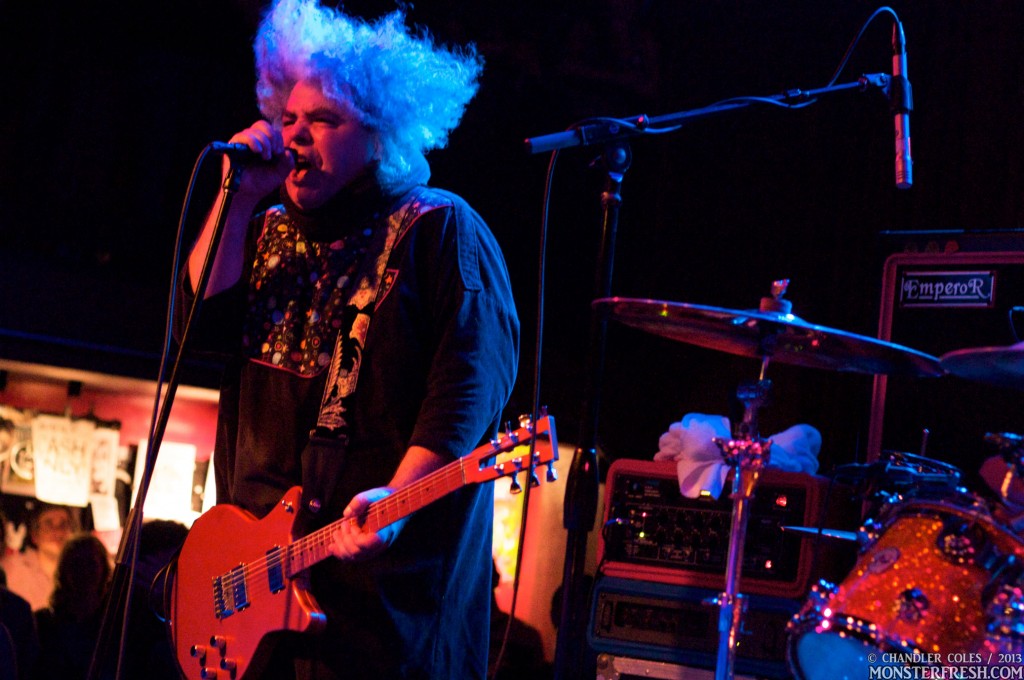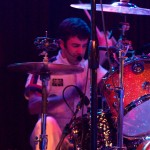A History of Bad Men: MELVINS 30th Anniversary [Seattle]
Legendary sludge-wielding innovators, Melvins return to their home in the Northwest to celebrate 3 decades in the game. One writer catches his very first show.

MELVINS
30th Anniversary Tour
Neumos
Seattle, Wa
August 16, 2013
The Melvins are legends, simply put. The bill: A 30th Anniversary Tour, at Neumos in Seattle (in many ways, a home city for the group) sounded all too irresistible. It was to be my first Melvins show and I walked into it with many preconceptions of the band and views on their style. Their music is completely unpredictable and their discography, so well rounded, that, in addition to original drone-y repetitious texture pieces and sludgy riff-driven drop-tuned rhythms, one can find covers from the likes of The Cars, KISS, and The Butthole Surfers on their albums. Ok, so that appeals to some people, including myself. And those who it does appeal to have elevated the group to a godly cult status built upon many factors.
First, there’s the outspoken King Buzzo (Roger Osbourne, legally) who can be seen on old Fox News clips sarcastically dissing celebrities and sporting his self-proclaimed, once-a-year-washed, light-grey mop. Then there’s the band’s 51 day tour, which consisted of them playing 51 consecutive shows in 51 states (Washington, D.C. included), for which they created a tour diary with SPIN magazine. Among the diary entries–written by all of the Melvins’ members–you can learn about the things Buzz hates, like flying and strippers, and even read about his dreams of axe-murdering eight-year-olds. A front man so outwardly verbal and opinionated creates a dialogue between his stage/studio persona and his own personal life. His comments on other bands that he thinks suck–whether his issue with them is that they are too mainstream, even though they are marketed as fringe, or that they are simply uninteresting–creates a partition between Melvins and the less heavy, the less truly unique. People who run to the band’s side do so passionately. For a while, I had been on the fence, hearing more about The Melvins, than actually hearing The Melvins, before slowly unveiling their albums one by one. After absorbing their in-studio work and now, experiencing them live, I still question my feelings for the group and hesitate to put them on the throne that so many have reserved for them. How could I be so undecided?
Buzz went to high school with Kurt Cobain, who famously referred to The Melvins as the past, present, and future of music. Osbourne, who actually taught Kurt about punk, by lending him records, and introduced him to David Grohl, has even claimed that one third of Nirvana is The Melvins, which is probably the most true of the album Bleach. King Buzzo‘s band’s genius is untouchable among those who know these backstories, and they are some of the reason that the group has solidified their legendary status; that and the fact that they have received very little fame in relation to their immense influence.
 As it stands now, the Melvins lineup consists of Buzz Osbourne (vocals and guitar), Dale Crover (drums and back-up vocals), Coady Willis (drums), and bassist, Jared Warren (who was not present for this show). Replacing Warren was Jeff Pinkus of both The Butthole Surfers and the opening band for the evening, Honky. Seeing two drummers on stage is bad ass! Even when they are playing the same beat, fill, and not straying much from each other, the fullness of the sound is noticeable. Watching the double sets of drumsticks raise before pounding down onto the toms and snares adds anticipation to the forthcoming beat; their unification seeming ritualistic. Dale Crover has as signature of a drum sound as you can find anywhere–a detached stomp with huge force. When he and Willis individualize, the sustainment of the slow and crunchy guitar notes is juxtaposed by chaotic speed.
As it stands now, the Melvins lineup consists of Buzz Osbourne (vocals and guitar), Dale Crover (drums and back-up vocals), Coady Willis (drums), and bassist, Jared Warren (who was not present for this show). Replacing Warren was Jeff Pinkus of both The Butthole Surfers and the opening band for the evening, Honky. Seeing two drummers on stage is bad ass! Even when they are playing the same beat, fill, and not straying much from each other, the fullness of the sound is noticeable. Watching the double sets of drumsticks raise before pounding down onto the toms and snares adds anticipation to the forthcoming beat; their unification seeming ritualistic. Dale Crover has as signature of a drum sound as you can find anywhere–a detached stomp with huge force. When he and Willis individualize, the sustainment of the slow and crunchy guitar notes is juxtaposed by chaotic speed.
Buzz has stated that using a 2nd drummer adds excitement. He, of course, is right, but also adding to the excitement is the frontman’s hair, which was stationed quite perfectly above a fan onstage, making it look as if he had entered the slowest time-travel tube ever discovered by a rock musician, while moving to the frozen, sludge-like pace of the track “Eye Flys,” from the band’s 1987 full-length debut, Gluey Porch Treatments. Osbourne destroyed guitar solos throughout the show, displaying a talent for picking apart riffs and making a scattered marble mess for the crowd to slide along, completely out of balance. At other times, he tastefully touched Sabbath-like epicness on songs like “A Growing Disgust,” from last year’s Freak Puke.
The group does not lack quality. The live rendition of “Let it All Be,” was one song that I thought far exceeded the original off The Bootlicker (1999), heavy-ing up the more alt-rock tone and vocals. One surprise for me was that the opinionated King Buzzo did not talk much at all throughout the show, and, besides the fan, which seemed a little too perfectly placed, there were no real performance tricks. The music was given utmost priority and the band sounded incredibly tight.
One of the strengths of The Melvins is that their discography demonstrates a multitude of styles, and tones. Stag (1996) is tripped out with Buzzo, sometimes singly, quite soft and airy; The Maggot (1999) includes some of the softest and lightest tracks that the groups has ever produced; and Bullhead (1991) is nothing but their signature sludge. Sometimes listening to a Melvins record is like tuning a broken radio; songs come in and out of nowhere to the point that it’s almost comical how different they are from one to the next–a true surprise. Excluding the drum-heavy finale, I felt like the actual noises that I was digesting during the live show, were somewhat predictable. This 30th anniversary show had pretty much the same tone throughout, with the group never really diving into the same crazy direction of noise, or pop, that I have heard on their albums. While listening to their recorded work, I sometimes feel like I am being challenged to go places that I don’t really want to go. “How heavy can you handle?,” these musicians ask. “How slow can we make you repeatedly nod your head?” During this live performance, I did not feel challenged. I lamented this missing quality, yet thoroughly enjoyed the show.
After the set, I caught up with a friend outside. He told me of a confrontation that he experienced with Buzz backstage. What led to this? How could this young innocent unintentionally turn one of his heroes against him? It intrigued me and questions arose in my mind: “How much of a mythology goes into the reading of a bands performance?” I thought some more about my enjoyment of the show. Do The Melvins demand me to put them into the category of legends, or is their legend so solidified in my mind that every strummed chord in Drop D tuning (or a tuning more foreign) simply fulfills my occasional need to get get heavy? A certain attitude can aggrandize a rock band, such as trashing other bands, or just generally not giving a fuck. People often wish that they didn’t have to give as much of a fuck in their own everyday lives, and, sometimes, respect those rock musicians who so admirably reflect those desires, more than others. I appreciate the attitude of The Melvins. Their music is truly uncompromising and I wish that I wasn’t so jaded by years of outside commentary and could just hear the band without the limitations of knowing who they are and what they represent on a larger scale. Seeing them live, the enjoyment that they had playing and the clarity of their musical message, allows me to now replace some of that mythology with personal experience.


